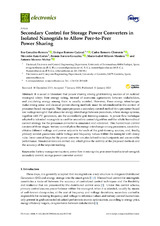Secondary Control for Storage Power Converters in Isolated Nanogrids to Allow Peer-to-Peer Power Sharing
Autor
González-Romera, Eva
Romero-Cadaval, Enrique
Roncero-Clemente, Carlos
Ruiz-Cortés, Mercedes
Barrero-González, Fermín
Milanés-Montero, María-Isabel
Moreno-Muñoz, A.
Editor
MDPIFecha
2020Materia
Battery management systemPower flow in microgrids
Prosumer-based isolated nanogrid
Secondary control
Storage power converter control
METS:
Mostrar el registro METSPREMIS:
Mostrar el registro PREMISMetadatos
Mostrar el registro completo del ítemResumen
It is usual in literature that power sharing among grid-forming sources of an isolated microgrid obeys their energy rating, instead of economic agreements between stakeholders, and circulating energy among them is usually avoided. However, these energy interchanges make strong sense and classical power sharing methods must be reformulated in the context of prosumer-based microgrids. This paper proposes a secondary control method for a prosumer-based low-voltage nanogrid that allows for energy interchange between prosumers, where storage systems, together with PV generators, are the controllable grid-forming sources. A power flow technique adapted to islanded microgrids is used for secondary control algorithm and the whole hierarchical control strategy for the prosumer converter is simulated and validated. This hierarchical control consists of three stages: tertiary control plans the energy interchange among prosumers, secondary obtains different voltage and power setpoints for each of the grid-forming sources, and, finally, primary control guarantees stable voltage and frequency values within the nanogrid with droop rules. Inner control loops for the power converter are also defined to track setpoints and assure stable performance. Simulation tests are carried out, which prove the stability of the proposed methods and the accuracy of the setpoint tracking.

